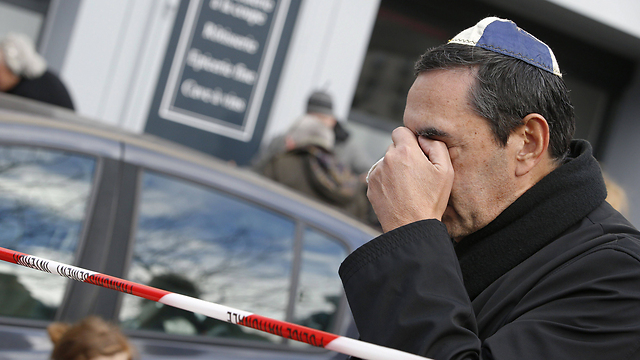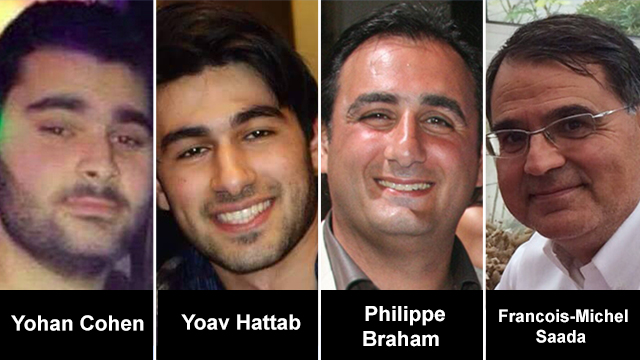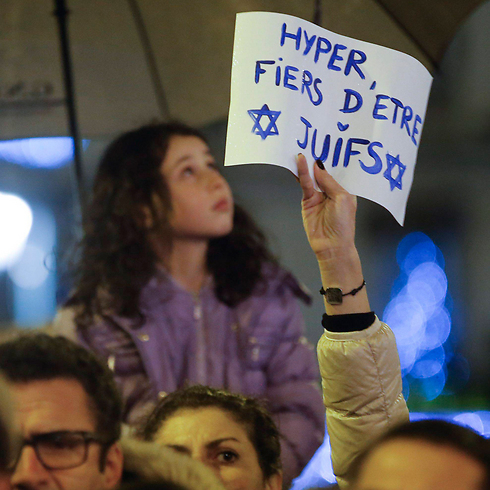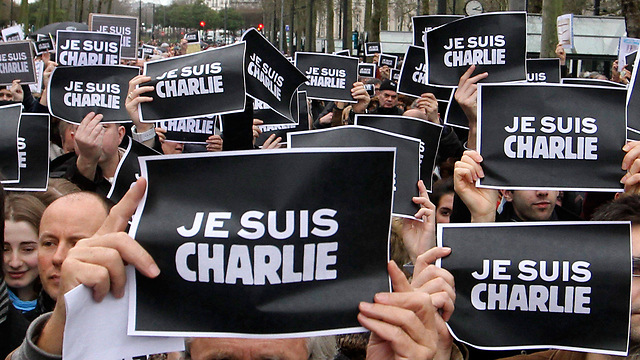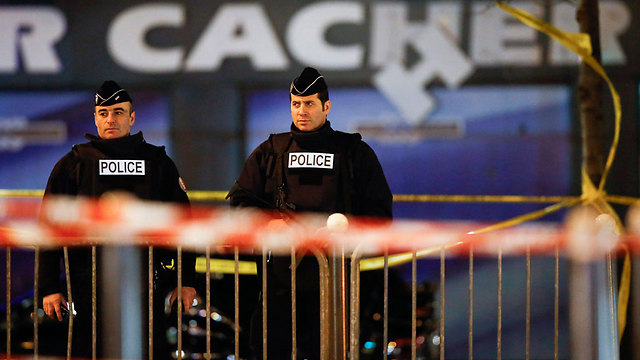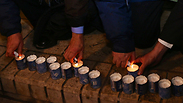
On Saturday evening – at the end of Sabbath – the lighting will once again change and another solidarity rally will take place – the second in a week. This time, in honor of the Jews murdered and wounded in the attack on the kosher supermarket "Hyper Cacher" in Port de Vincennes. Four dead and another four seriously wounded in a attack that followed the massacre at the Charlie Hebdo offices.
The sign in front of the store is damaged from the explosions that took place when the French forces broke into the shop, but the supermarket's prominent position on the main street and the big inscription that reads "kosher" make it clear that this is a "non-apologetic" Jewish community. A well-established and secure community that suffered a large trauma.
"Today I'm Jewish"
Neighbors and visitors arrive to lay out a wreath and pray near the gazes of dozens of journalists and policemen.
Related stories:
- Kosher supermarket attack victims to be laid to rest in Israel
- Four victims of terror attack on kosher supermarket named
- Violence fuels debate among Muslims over interpreting faith
"The government is weak and the radicals leave prison more faithful and more radical," says Rutti in Hebrew, a resident of Paris who came to visit her daughter who lives in the neighborhood. "In Israel we know not to surrender to terror."
Rutti was not surprised by the attack as she says that after a "general" attack the fire is always pointed at the Jews. And Aliyah - immigration to Israel?
"After an attack, the whole community always talks about making Aliyah, and then they forget about it," says Rutti. "Even though 6,000 have made Aliyah in recent years."
Next to Rutti stands Lance, who is wearing a Kippah (Yarmulke). "Today I'm Jewish," he explained.
Approximately half a million Jews lived in France up until a year ago, making it the largest Jewish community in Europe. But the rise of anti-Semitism has driven many away, according to the chief rabbi of France, Haim Korsia – mainly to the UK, Israel, and North America.
Figures from the Immigrant Absorption Ministry corroborated claims that Jews are fleeing France. A record 6,600 French Jews moved to Israel in 2014, a 32 percent increase compared to the previous year, in which the French became the largest group of immigrants to Israel.
Stastistics also showed a total increase of 88 percent in immigration from Western Europe, with the arrival of 8,640 people in 2014, compared to about 4,600 in 2013. About 620 immigrants arrived from the UK, compared to 520 in 2013 – an increase of about 20 percent – and 340 Italians, double the number from the previous year.
Stephen Pollard, editor of the UK's Jewish Chronicle newspaper, claimed that the terror attack in France would cause more Jews to leave France. He said it was no coincidence that a Jewish business was selected as a target. "Every Jewish Frenchman I know has either left the country or preparing to," he wrote.
"What's happening in France, which keeps getting worse and worse over the years, gives a unique perspective on the problem of anti-Semitism." According to Pollard, there are currently only 400,000 Jews in France. "This is the largest Jewish exodus since the war. This is a fact," he said.
Under threat
A synagogue on a narrow street in the center of the neighborhood is surrounded by blockades and police. The pressure is high. They stop anyone who attempts to take a picture of the synagogue from which Orthodox Ashkenazi and traditional Sephardim exit.
"The atmosphere is different, but we did not skip any prayer," says David. "The feelings are heavy. There is a bit of fear." Families leave the synagogue hunched over.
French security forces are under pressure. The Prime Minister of France, Manuel Valls, admitted on Friday that there were fundamental problems with the work of the French intelligence. "This is the significance of the murder of 16 people," said Valls. The French do not know "from where it will come to them" and not knowing leads to panic.
Near the supermarket, Rutti says it is "an illness that you attack from within, from within France" and the response is fitting.
Anonymous phone calls to the police and severe intelligence assessments led several prominent shops in the historic Le Marais district which house designer stores such as Michael Kors and Uniqlo.
Street traffic was open and TV and radio channels on full-volume were heard in several areas. It is clear to everyone that the events of the past week tell a bigger story than an eruption of violence. When "I am Charlie Hebdo" appears with a black background in every corner it signifies that the entire nation of France was wounded this week.
Elizabeth Shem-Tov, a Jewish woman who lives east of Paris, said that the younger generation is thinking of emigrating. "There is no future for the young in France. There are no jobs and the wages are problematic. The Jews are debating between California and Tel Aviv," she says.
Elizabeth believes that the large Muslim community most likely suffers from the radicals and that the majority is against these types of acts, but everyone must be careful.
Radicalized youth
In contrast, Rami Nagar, a Christian-Arab businessman who immigrated to France from Lebanon in 1983 and lives in Cannes in southern France, is much more worried.
"I employ immigrants from North Africa, and they are only becoming more radicalized. They did not come to assimilate but rather they live in ghettos full of poverty. I think they are happy about what happened, because someone who has nothing does not have anything to lose," he says.
Surprisingly, he agrees with Shem-Tov: The taxes in France are high, the work is hard and the joy is limited: "…In Lebanon and Israel they know how to enjoy life," he says. A view that can surprise.
On Saturday, the stores reopened. The security guards at the entrance of Galeries Lafayette, a French department store, began checking bags, but behind the light security, the upscale brands of France, who are just starting their season, tried to maintain a normal balance.














